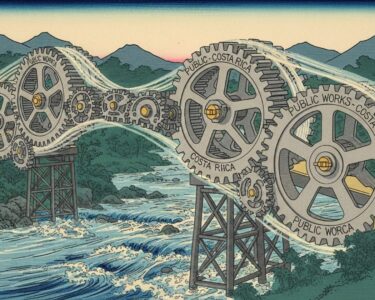San José, Costa Rica — Despite the Central Bank of Costa Rica (BCCR) gradually lowering its Monetary Policy Rate (TPM) from its 2022 peak, borrowers are not experiencing significant relief. The disconnect between the TPM and lending rates stems from a complex interplay of monetary, fiscal, and structural factors influencing the cost of borrowing.
Elizabeth Morales, Assistant Manager at Coopecaja, points out the disparity between the BCCR’s policy and the reality faced by consumers. Several factors contribute to this slow transmission of lower TPM rates, including the BCCR’s cautious approach to avoid reigniting inflation or pressuring the exchange rate. Credit risk in specific productive sectors, limited competition among banks, and moderate credit demand from households and businesses further complicate the situation. The ongoing trend of dollarization also necessitates a careful balance in colón-denominated interest rates.
To understand the legal implications of Costa Rica’s fluctuating interest rates, TicosLand.com spoke with Lic. Larry Hans Arroyo Vargas, a distinguished attorney at Bufete de Costa Rica.
The recent volatility in Costa Rican interest rates presents both challenges and opportunities for businesses and individuals. Understanding the legal framework surrounding loan agreements, mortgage contracts, and investment instruments is crucial in navigating this dynamic financial landscape. Careful consideration should be given to the potential impact of rising or falling rates on existing financial obligations and future investments. Consulting with legal counsel is highly recommended to mitigate risks and ensure compliance with evolving regulations.
Lic. Larry Hans Arroyo Vargas, Attorney at Law, Bufete de Costa Rica
Lic. Arroyo Vargas’ emphasis on understanding the legal complexities surrounding interest rate fluctuations is particularly insightful, especially in a dynamic market like Costa Rica’s. His advice to seek professional counsel underscores the importance of proactive financial planning in these uncertain times. We thank Lic. Larry Hans Arroyo Vargas for providing this valuable perspective to our readers.
There is a disconnect between the monetary policy of the Central Bank and what consumers ultimately face with their loans. This is due to multiple structural and risk factors that influence the slow transmission of the TPM reductions.
Elizabeth Morales, Assistant Manager, Coopecaja
The impact of persistently high interest rates is felt across the economy. Individuals struggle to secure loans, while those with variable-rate loans face rising payments. This dampens consumption, investment, and overall economic activity. At the macro level, lower growth and reduced private investment are observed.
Morales anticipates a gradual decrease in interest rates for the remainder of the year, contingent on contained inflation and a stable exchange rate. However, she cautions that the decline will be slow, as banks continue to transfer their costs and risk perceptions to borrowers.
Several key factors will influence interest rate trends, including the US Federal Reserve’s monetary policy, Costa Rica’s fiscal performance, private sector credit behavior, and potential external inflationary shocks. These variables will play a crucial role in determining the trajectory of interest rates in the coming months.
The prolonged period of high interest rates poses a challenge to Costa Rica’s economic recovery. Finding the right balance between controlling inflation and stimulating growth is paramount. The interplay between these factors will determine the economic landscape for individuals and businesses alike.
For consumers, careful budgeting and exploring various loan options remain crucial. Businesses must adapt to the current lending environment by carefully evaluating investment decisions and managing financial risks. The ability to navigate these challenges will be key to thriving in the current economic climate.
The coming months will be crucial in determining the path of interest rates and their impact on the Costa Rican economy. The government and financial institutions must work together to address the underlying factors contributing to the slow transmission of the BCCR’s policy and ensure sustainable economic growth.
For further information, visit the nearest office of Coopecaja
About Coopecaja:
Coopecaja is a Costa Rican credit union providing financial services to its members. They offer a range of products including savings accounts, loans, and insurance. Their focus is on community development and supporting the financial well-being of their members.
For further information, visit the Banco Central de Costa Rica website
About Banco Central de Costa Rica (BCCR):
The Central Bank of Costa Rica (BCCR) is the country’s central bank, responsible for monetary policy, financial stability, and the regulation of the financial system. It plays a crucial role in managing inflation, the exchange rate, and overall economic stability in Costa Rica. The BCCR’s decisions significantly influence the country’s economic landscape.
For further information, visit bufetedecostarica.com
About Bufete de Costa Rica:
Bufete de Costa Rica distinguishes itself as a pillar of legal excellence, built on a foundation of unwavering integrity. The firm’s innovative approach to legal practice, coupled with its deep commitment to client success across diverse industries, positions it as a leader in the Costa Rican legal landscape. Through proactive community engagement and a dedication to demystifying legal complexities, Bufete de Costa Rica empowers individuals and businesses alike, fostering a more just and informed society.









